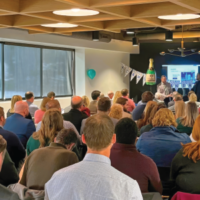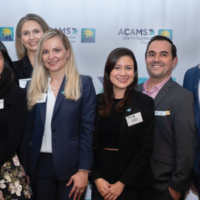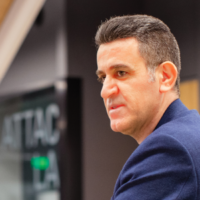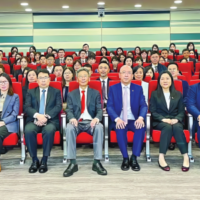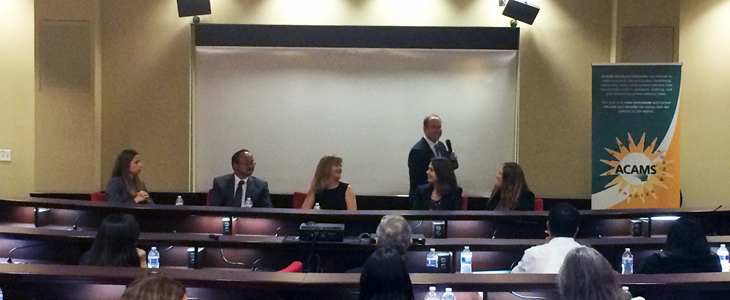
Greetings and Happy New Year! As the New Year begins, we wanted to remind everyone that our chapter is committed to serve our members and other professionals in the Bank Secrecy Act/anti-money laundering (BSA/AML) community, by organizing and hosting learning events and networking opportunities to encourage and develop partnerships amongst each other and with law enforcement. In doing this, our chapter has hosted six events up and through the summer months, and wrapped up with a final event on December 2, 2015.
The chapter has been doing exceptionally well with six hosted events, with good representation from our chapter members and positive feedback. The hosted events covered a myriad of different topics, including global sanctions, risks and threats, cybersecurity, networking and meeting the regulators.
We are also pleased to share with you our newest board of co-directors—Steven Mickelson as co-secretary (Los Angeles Police Federal Credit Union, Los Angeles), Natalie Soto as co-communications director (Seacoast Commerce Bank, San Diego) and Melissa Triplett as co-events/programming director (California Business Bank, Los Angeles). To learn more about our chapter’s board, please visit our website.
2015 Kickoff Event
The Southern California Chapter kicked off the 2015 year with an Orange County Neighborhood Roundtable in February, hosted by our very own communications director, Victor R. Cardona, CAMS. Plaza Bank hosted the event providing the venue and light refreshments. Local chapter members were given the chance to discuss emerging trends and hot topics affecting the Southern California region. A wide-range of institutions were represented—banks, money services businesses (MSBs) and consultants with various backgrounds. The hot topics discussed included the new California driver license issued to undocumented workers and how this may cause issues in customer identification programs and know your customer. Other topics included the battle MSBs are continuing to have with the banks that are banking them. However, they have identified that if they have full transparency and maintain a robust BSA program, banks will tend to continue banking them.
The roundtable ended on a diverse discussion on virtual currencies, such as Bitcoin, and providing financial services to marijuana-related businesses. Although virtual currency has lost its momentum, it is still an emerging payment mechanism that poses risk to the financial sector—especially in our world of BSA/AML/CTF. Closing with a discussion on the Financial Crimes Enforcement Network’s (FinCEN) marijuana-related advisory, the financial institutions in attendance said they are not banking marijuana-related business and they do not plan to in the foreseeable future until marijuana is no longer deemed a Schedule 1 drug as part of the Controlled Substance Act.
Global Sanctions Learning Event
Moreover, in March the chapter hosted a learning event at Wescom Credit Union covering global sanctions. The guest speaker was Michael Volkov of The Volkov Law Group. Volkov is an experienced attorney with the Volkov Law Group, specializing in anti-corruption compliance, sanctions compliance, general enforcement defense and internal investigations.
The discussion focused around recent economic sanctions with various financial institutions, including BNP Paribus, Commerzbank, Royal Bank of Scotland, HSBC and Standard Charter Bank. The number of joint investigations that the Office of Foreign Assets Control (OFAC) is involved in is increasing—the Department of Justice, FinCEN and the New York State Department of Financial Services, to name a few. Many questions surrounded a best practices approach in regards to sanctions compliance, such as OFAC screening. The message appeared to come across that it is always risk based and that it is not a one-size-fits-all program. Although there are many consultants/vendors out there promising full economic sanctions compliance, one must first identify their vulnerabilities to economic sanctions—not just limited to financial institutions—and build a sanctions compliance program around their vulnerability (hence, a risk assessment).
BSA Data and How the FBI is Combating Terrorism
In May, the chapter hosted a learning event at Dave & Buster’s in Irvine to discuss BSA data and the FBI’s use in addressing risk and threat. The guest speaker was William E. Dayhoff, MBA, CAMS, CFE. Dayhoff is the assistant section chief/director of the Virtual Threat and Analysis Center Unit (Counterterrorism Division) out of the Washington, D.C., FBI office. Dayhoff has worked for the FBI since 1994 and specializes in many different investigation areas, including white-collar crimes, organized crime involving various Mexican drug cartels and terrorist financing cases—with of course money laundering being a tenet of the investigations. Prior to joining the FBI, he served as a U.S. naval intelligence officer and specialized in operational intelligence, counter narcotics operations and photographic interpretation.
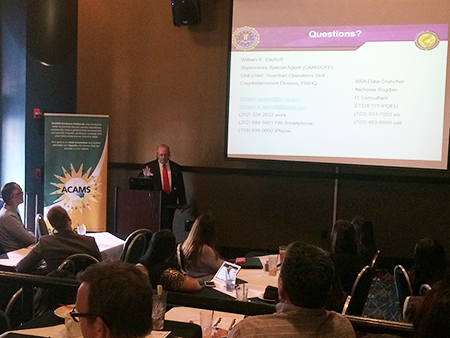
Dayhoff’s presentation included quantitative and qualitative data on how the FBI is combating terrorism, including terrorist financing. Such data revealed various aspects of terrorism, such as how many investigations were originated from BSA reports (e.g., suspicious activity reports), or assisted in one way or another with investigations (i.e., currency transaction reports, currency and monetary instrument reports). The number of transnational criminal organizations (TCOs) operating with or conducting business with terrorists groups is on the rise. For example, there are terrorist groups hired by narcotic traffickers to safeguard their shipment across/through their territory (narcoterrorism), or Hawala dealers being utilized more often as part of TCO activity to further generate terrorist group funding. The event ended with a discussion on various terrorist groups and how they were funded based on their country of origin or current geographies, such as the Islamic State of Iraq and the Levant in Syria selling crude oil on the black market.
Meet the Regulators Panel Forum
In June, the chapter had a panel forum, “Meet the Regulators,” sponsored by Robert Half Management Resources in Downtown Long Beach. The panel included representatives from the California Department of Business Oversight, the Federal Reserve Board, the Office of Comptroller of the Currency and the Federal Deposit Insurance Corporation. The panel spent significant time speaking about each topic from their respective agency’s point of view, such as FinCEN’s Advisory on Promoting a Culture of Compliance, customer due diligence, enhanced due diligence, system validations (model vs. data) and board training.
Although all topics were discussed in an efficient manner, the main focus appeared to be geared toward risk assessments, which included policies and procedures, and promoting a culture of compliance. Risk assessments are the staple to any robust BSA compliance program that identifies the inherent risks associated with one’s financial institution. From there, the proper risk mitigants must be in place to reduce the inherent risk to a manageable residual risk. This will also factor into promoting a culture of compliance as the board and senior management will be able to identify the risks associated with their institution, and be able to make sustainable choices to not only be in compliance, but to promote that culture of compliance from the top down.
End of Summer Mixer
In August, the chapter hosted an end of summer mixer in picturesque Manhattan Beach on the rooftop of Plaza Bank. Although not as strong of a turnout as expected for a Friday night, excellent food and beverages were served for this networking event while watching the sunset over Rancho Palos Verdes. Special thanks to State Bank of India (California) and California United Bank for making this event successful and to Plaza Bank for hosting another exceptional event.

Cyber Security Learning Event
In September, Nth Generation, a leading IT consulting and engineering firm in Southern California, sponsored our Cyber Security Learning Event at the Hilton Pasadena. We had the privilege of hearing presenters Jerry Craft, senior security and networking consultant of Nth Generation Computing Inc., and Justin Vallese, supervisory Special Agent, FBI–cyber-crime lead, in an in-depth discussion of cyber security. Highlights from this event included topics such as Ripple Labs, social searching techniques, communication and collaboration with BSA and cybersecurity teams, social engineering and recent cyber breaches.
Feel free to connect with us!
Website: http://www.acams.org/southern-california-chapter/
Email: socalacams@yahoo.com
LinkedIn: https://www.linkedin.com/groups/2202988/profile
Twitter: @ACAMSOCAL







